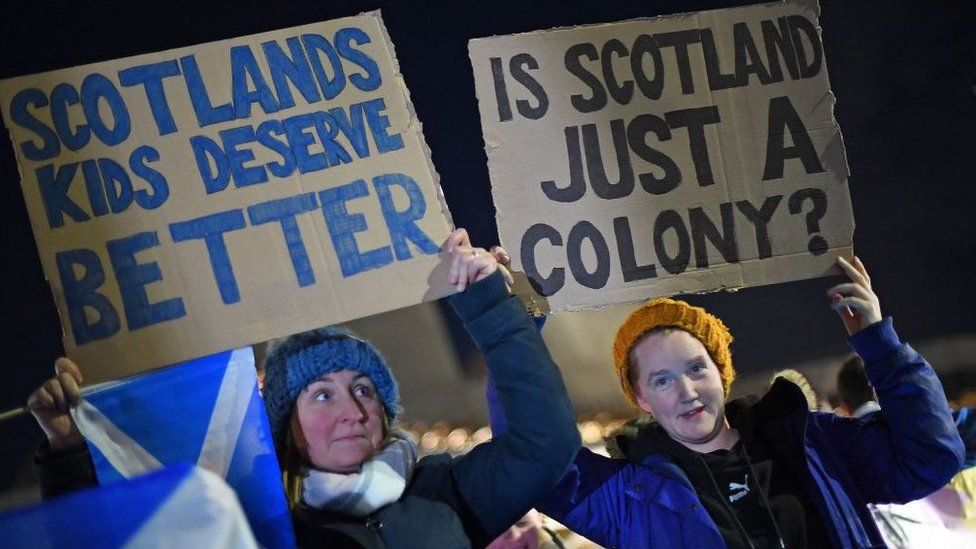ARTICLE AD BOX
 Image source, Getty Images
Image source, Getty Images
Independence supporters held rallies across Scotland on Wednesday evening
By James Cook
Scotland editor
For years politicians and the public have pronounced on Scotland's future, a topic where passions run high.
Now the judges have had their say in the calm and careful language of the law.
The issue at hand in the Supreme Court was relatively narrow. It was not whether Scotland should be independent or even whether there should be a referendum but specifically whether Holyrood could hold a poll without the consent of Westminster.
The answer was not a surprise but it leaves two big questions hanging in the air for Prime Minister Rishi Sunak and First Minister Nicola Sturgeon.
Is the UK a voluntary union of nations? Is there a credible path to independence?
In 2016 voters in Scotland said no to Brexit by a big margin and were forced to leave the EU anyway; they have rejected Conservative rule for decades; and last year they again elected a majority of MSPs to the Scottish Parliament on manifesto commitments to hold another referendum.
That is the core of the case for another referendum.
The case against focuses on stability, security and the fact that Scottish voters have already had a chance to choose a different path which, in 2014, they rejected by 55% to 45%.
In my travels around Scotland these days I hear two contradictory views about the economics of independence: the first, that things are now so bad that Scotland may as well jump in the lifeboat; the second that these tough times would be the worst possible moment to set sail as an independent nation.
Either way the polls aren't shifting much. The nation appears to remain more or less evenly divided.
In any case there now appears to be almost zero chance of a second uncontested poll on the issue.
Last time London agreed to lend Edinburgh the power to stage it. Now Mr Sunak refuses to do another deal, arguing that voters understood the first referendum to be a once-in-a-generation poll and that it makes more sense to focus on tackling the cost of living crisis.
That is what forced the Scottish government's hand and propelled the alternative plan into the Supreme Court where five judges ruled, unanimously, that Holyrood could not hold a "Made in Scotland" poll without the consent of Westminster.
This was not Nicola Sturgeon's preferred path, nor was victory ever likely, but even so the first minister admitted the judgment was a hard pill to swallow.
Now she intends to try to frame the next general election as a referendum in all but name.
She says the SNP will thrash out the tricky details — and they are exceptionally tricky — at a special party conference which she tells me will be held in early spring.
That will not quiet difficult questions about the mechanics and the legitimacy or otherwise of Ms Sturgeon's de facto referendum plan.
Some of those questions come from her own side.
The independence movement is far more divided than it was eight years ago and some "yessers" worry that the first minister is leading them into a trap.
The first concern is that even if she prevails Ms Sturgeon may struggle to prove that a majority of voters casting ballots for independence-supporting parties is an unambiguous vote for leaving the UK.
The second is that even in the yellow wave that swept the nation in 2015 when the SNP won all but three of the 59 Scottish seats at Westminster, the party still failed, by a whisker, to top 50% of the vote.
When I put those concerns to the first minister in her news conference she batted them away, insisting "if we can't win 50% of the Scottish population's support for independence we can't be independent," adding, "if we can't win we don't deserve to be independent."
Those words will not be forgotten.
In her news conference the SNP leader also acknowledged that this was not where she wanted to be at this stage of her campaign for independence, 36 years after she started knocking on doors for the SNP as a teenager in Ayrshire.
"A referendum is my preferred option," she said, acknowledging that her general election plan was "not perfect."
"Is that the best way of resolving this question? No," she said, bluntly.
The party and the wider movement have made stunning progress during Ms Sturgeon's political lifetime but despite a string of landslide election victories, that progress appears to have stalled.
Image source, Getty Images
Image caption,There were a handful of union supporters outside the Scottish Parliament after the Supreme Court ruling
And so Ms Sturgeon's advisers are hammering home the argument about democracy, pointing to paragraph 81 of the Supreme Court judgment which states that "a clear outcome" in any referendum "would possess the authority... of a democratic expression of the view of the Scottish electorate."
Mr Sunak's team on the other hand are stressing that they intend to cooperate with Edinburgh in Scotland's interests — Scotland has two governments is the refrain.
Labour may now hope to seize the initiative with another plan for reforming the UK constitution and with the party making progress in the polls nationally.
But for now Scotland remains divided.
Defenders of the union may be quietly pleased with the Supreme Court ruling. There were a handful outside the Scottish Parliament in the hours afterwards.
But it was supporters of independence who were out in force on the streets of towns and cities around the nation demanding that their voices be heard.

 1 year ago
18
1 year ago
18








 English (US)
English (US)